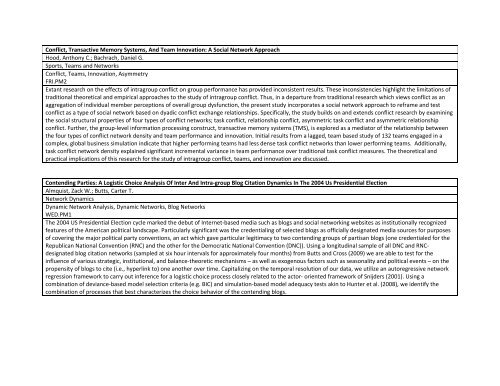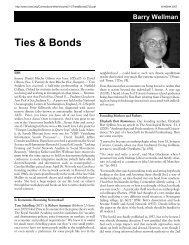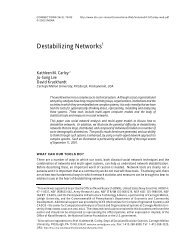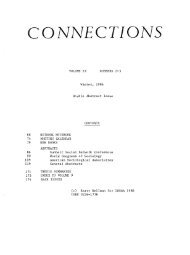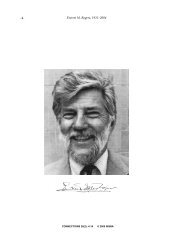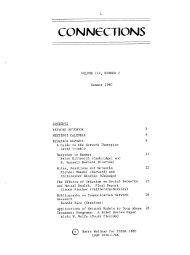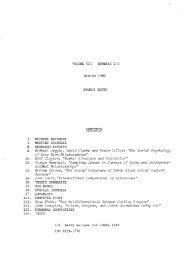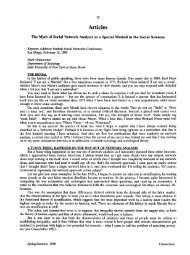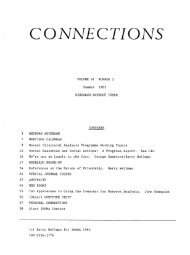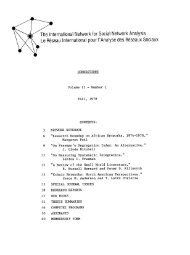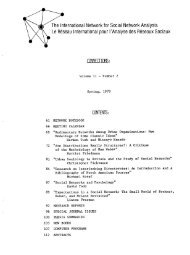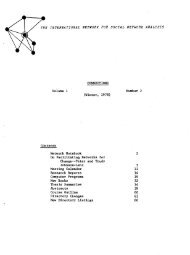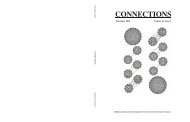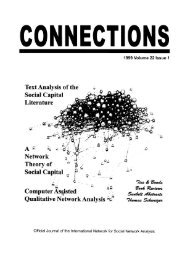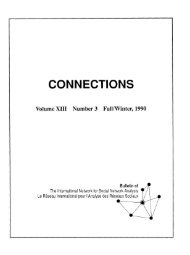Sunbelt XXXI International Network for Social Network ... - INSNA
Sunbelt XXXI International Network for Social Network ... - INSNA
Sunbelt XXXI International Network for Social Network ... - INSNA
Create successful ePaper yourself
Turn your PDF publications into a flip-book with our unique Google optimized e-Paper software.
Conflict, Transactive Memory Systems, And Team Innovation: A <strong>Social</strong> <strong>Network</strong> ApproachHood, Anthony C.; Bachrach, Daniel G.Sports, Teams and <strong>Network</strong>sConflict, Teams, Innovation, AsymmetryFRI.PM2Extant research on the effects of intragroup conflict on group per<strong>for</strong>mance has provided inconsistent results. These inconsistencies highlight the limitations oftraditional theoretical and empirical approaches to the study of intragroup conflict. Thus, in a departure from traditional research which views conflict as anaggregation of individual member perceptions of overall group dysfunction, the present study incorporates a social network approach to reframe and testconflict as a type of social network based on dyadic conflict exchange relationships. Specifically, the study builds on and extends conflict research by examiningthe social structural properties of four types of conflict networks; task conflict, relationship conflict, asymmetric task conflict and asymmetric relationshipconflict. Further, the group‐level in<strong>for</strong>mation processing construct, transactive memory systems (TMS), is explored as a mediator of the relationship betweenthe four types of conflict network density and team per<strong>for</strong>mance and innovation. Initial results from a lagged, team based study of 132 teams engaged in acomplex, global business simulation indicate that higher per<strong>for</strong>ming teams had less dense task conflict networks than lower per<strong>for</strong>ming teams. Additionally,task conflict network density explained significant incremental variance in team per<strong>for</strong>mance over traditional task conflict measures. The theoretical andpractical implications of this research <strong>for</strong> the study of intragroup conflict, teams, and innovation are discussed.Contending Parties: A Logistic Choice Analysis Of Inter And Intra‐group Blog Citation Dynamics In The 2004 Us Presidential ElectionAlmquist, Zack W.; Butts, Carter T.<strong>Network</strong> DynamicsDynamic <strong>Network</strong> Analysis, Dynamic <strong>Network</strong>s, Blog <strong>Network</strong>sWED.PM1The 2004 US Presidential Election cycle marked the debut of Internet‐based media such as blogs and social networking websites as institutionally recognizedfeatures of the American political landscape. Particularly significant was the credentialing of selected blogs as officially designated media sources <strong>for</strong> purposesof covering the major political party conventions, an act which gave particular legitimacy to two contending groups of partisan blogs (one credentialed <strong>for</strong> theRepublican National Convention (RNC) and the other <strong>for</strong> the Democratic National Convention (DNC)). Using a longitudinal sample of all DNC and RNCdesignatedblog citation networks (sampled at six hour intervals <strong>for</strong> approximately four months) from Butts and Cross (2009) we are able to test <strong>for</strong> theinfluence of various strategic, institutional, and balance‐theoretic mechanisms – as well as exogenous factors such as seasonality and political events – on thepropensity of blogs to cite (i.e., hyperlink to) one another over time. Capitalizing on the temporal resolution of our data, we utilize an autoregressive networkregression framework to carry out inference <strong>for</strong> a logistic choice process closely related to the actor‐ oriented framework of Snijders (2001). Using acombination of deviance‐based model selection criteria (e.g. BIC) and simulation‐based model adequacy tests akin to Hunter et al. (2008), we identify thecombination of processes that best characterizes the choice behavior of the contending blogs.


